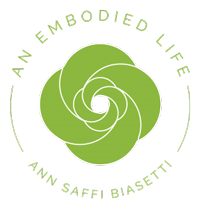As September rolled around so did a fair amount of anxiety. I should start by saying, YES, I too, experience anxiety. I affirm this because often when it comes to being in the role of therapist, educator, trainer, teacher, and now author, it can leave my students and clients wondering, does she go through this too? The answer is a big yes. And it is a yes that goes way back.
I fully respect that we each have a certain constitutional make-up based on many factors, including genetics and biology that determine the way we enter into the world. Respecting this, I know I was born with an easily revved-up, reactive nervous system. As far as gene expression, we now know that our environment can either increase or decrease the expression of all of this. But what it also means, is that we have to go way back and understand the nature of who we are, not just what happened to us. What makes you feel calm? What throws you off? If you are like me, then you know that you do not like transitions and lots of change. You also probably do not like a lot of unknowns in your life. The unknown creates more of that unstable feeling inside. I have come to recognize and understand these things about my system throughout the years.
September is filled with many unknowns for me. First off, my book is well out there now and it now has a life of its own. Who knows what it is doing? Who knows who is reading it? Who knows if it is helpful or not? Yes, these are some questions that arise from an anxious mind. Ones that wonder about the unanswerable. Then comes the speaking engagements. I have a few of those this month (you will see them listed below). Another thing that the anxious system does not like. What will I say? Will people know what I am talking about? Will I know what I am talking about? Whew! You get my drift. I have just stopped typing now and have taken a deep breath. Because the anxious system forgets when and how to do that when revved-up as well. Come back to your breath. Ground into your seat. Feel the earth support your body. From there notice how your body feels when under the weight of the unknowns and the heightened system. For me it lives in my stomach and chest and shoulders. Where does it live for you?
After discovering where you hold it all, stand up and take a few release breaths. In through your nose, out through your mouth. The next one as you exhale comes the words, THIS IS HARD! This is hard. Now let your arms drape across the front of your body. Hold onto opposite elbows and swing your arms. Soften your stance; soften your whole body. Notice how saying the words, this is hard, over and over, allows a release to take place. You’ve taken a moment of self-compassion by simply acknowledging exactly where you are at. No pretending. No running away from it. But simply acknowledging it as it is.
Because THIS is hard. This may be one thing today and something else tomorrow. The truth is we all have a “this.” So after you practice your self-compassionate acknowledgement, begin to acknowledge it for someone else. Start to see each person you meet as having her own “this” that is hard. See what happens inside of you. Each time you acknowledge it for yourself and then another you are beginning your practice of self-compassion.
